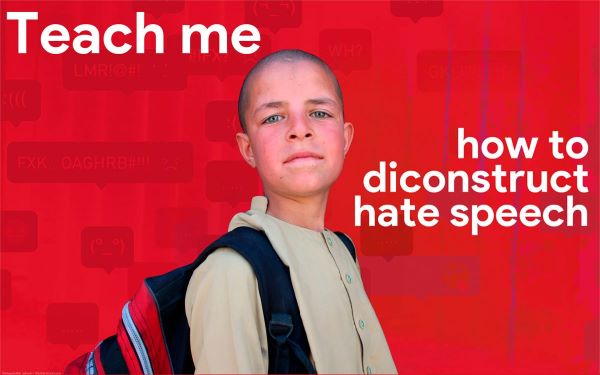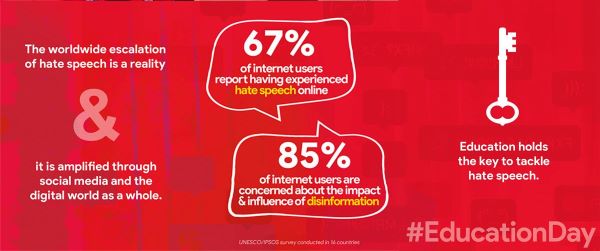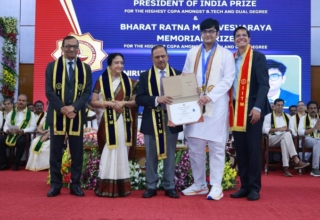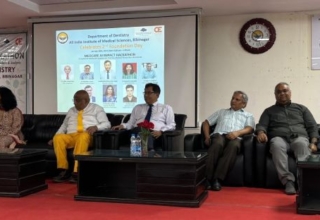
UNESCO is dedicating the International Day of Education celebrated on 24 January 2024 to the crucial role education and teachers play in countering hate speech, a phenomenon which has snowballed in recent years with the use of social media, damaging the fabric of our societies.
The world is seeing a surge of violent conflicts paralleled by an alarming rise of discrimination, racism, xenophobia, and hate speech. The impact of this violence transcends any boundary based on geography, gender, race, religion, politics, offline and online.
Hate speech fuels prejudice and discrimination and can enable and normalize violence. Its recent global escalation, amplified by the use of social media and exacerbated by new and protracted crises in different regions, severely impacts the safety and security of communities around the world. On this day, UNESCO urges its member states to prioritize education as a tool for promoting societies which value human dignity and peace.
The accelerated spread of hate speech is a threat to all communities. Our best defense is education, which must be at the heart of any peace efforts. It is our collective duty to empower learners of all ages to deconstruct hate speech, and lay the foundations for inclusive, democratic and human-rights respecting societies. “To succeed, we need to better train and support teachers who are on the front lines in overcoming this phenomenon,” said Audrey Azoulay UNESCO Director-General.
On January 24, UNESCO will organize a one-day online training for several thousand teachers from around the world on the deconstruction of hate speech, which will give them the tools to better spot, tackle and prevent hate speech incidents. This training is part of UNESCO’s action to help its Member States and education professionals address hate speech through education
The same day at the United Nations Headquarters in New York, UNESCO will bring together Ministers, education leaders, and educators from around the globe to discuss the central role of education in achieving sustainable global peace. In November 2023, UNESCO’s 194 Member States adopted a new recommendation which establishes a global framework in this area.
Recent explosion of hate speech
Hateful messages and conspiracy theories that target and scapegoat specific communities have become increasingly amplified on social media and other online platforms. A recent UNESCO/IPSOS survey conducted in 16 countries revealed that 67% of internet users reported had encountered online hate speech and that 85% were concerned about the impact and influence of disinformation on their fellow citizens, viewing it as a real threat which can destabilize societies.
Following the 7 October 2023 Hamas terrorist attack against Israeli civilians, the Anti-Defamation League found a 337% increase of antisemitic incidents in the USA, 320% increase in Germany, 961% increase in Brazil in comparison to the previous year; and an increase of 818% compared to the past 3 years in the Netherlands. The UK-based Institute for Strategic Dialogue (ISD) also found a 43-fold increase in the volume of anti-Muslim discourses on YouTube comparing the four days before and after the attack.
New standard-setting instrument on education for lasting peace
Education offers multiple opportunities to address the root causes of hate speech and sensitize learners of all ages to its forms and consequences online and offline. This includes equipping learners with the skills to recognize and respond to hate and injustice, preparing them to respect the value of diversity and human rights, and teaching them to recognize the difference between hate speech and freedom of expression.
UNESCO’s General Conference recently revised its Recommendation on Education for Peace, Human Rights and Sustainable Development with this goal. It is the only global standard-setting instrument that lays out how education can bring about lasting peace and foster human development. This instrument will shape education systems and policies in the next decades, from laws and policies to curricula development, teaching practices, learning environments and assessments.
In 2023 UNESCO published the guide “Addressing hate speech through education” to help decision-makers strengthen their public policies in this area. The Organization is also stepping up its efforts to promote anti-racist guidelines and address racism in textbooks as well as a global initiative to combat antisemitism in and through education.
| Specifically, education should be transformative, build a strong foundation of literacy and numeracy and enable the development of knowledge, skills, values, attitudes and behaviours such as:
(a)Analytical and critical thinking: the ability to question norms, practices and opinions, critically analyse and understand complex systems and multicultural environments, as well as understand power dynamics and the interconnections between countries, populations and the natural environment and between local, national, regional and global levels; (b)Anticipatory skills: the ability to act as agents of change and the capacity to evaluate and understand emerging and future opportunities and threats and to adapt to new possibilities with a view to promoting a peaceful, just, equal, equitable, inclusive, healthy and sustainable future for all; (c)Respect for diversity: the ability to understand, value and respect the equal dignity and rights of every person, regardless of race, colour, descent, gender, age, language, religion, political opinion, national, ethnic or social origin, economic or social condition of birth, or disability and any other grounds as well as their needs, perspectives and peaceful actions and valuing their diverse knowledge systems and learning activities; (d)Self-awareness: the ability to acknowledge and reflect critically on one’s personal values, perceptions and actions, to know, value and be at peace with oneself, understand and manage emotions, feel and show empathy and respect for others and for one’s role in the local, national, regional and global community; (e)Sense of connectedness and belonging to a common and diverse humanity and planet Earth: understanding humanity as a global community that shares responsibility for a healthy planet and for respecting the needs and rights of each other, of other living beings and of nature itself; (f) Empowerment, agency and resilience: the motivation, confidence and ability to act and respond effectively, proactively, consciously and responsibly to challenges at local, national, regional and global levels, while being able to cope with risks, conflicts of goals and uncertainties; (g)Decision-making skills: the ability to evaluate the impact of actions, and make decisions, using available information from diverse and reliable sources; (h)Collaborative skills: the ability to effectively communicate feelings and opinions in a constructive manner and engage in collaborative interactions, participatory planning and sharedproblem-solving marked by responsible and respectful behaviour; (i) Adaptive and creative skills: the capacity to adapt, engage, create, innovate, and thrive in a fast-evolving environment and in diverse and shifting contexts, so that new ideas can be transformed into actions; (j) Citizenship skills: the ability to act ethically and responsibly and to fully participate in civic and social life, in a digital era and in a local, national and global context; (k)Peaceful conflict resolutionand transformation skills: the ability to deal with and contribute to the prevention, mediation and resolutionof conflicts in a peaceful, constructive and negotiated manner and end cycles of violence and hostility; (l) Media and information literacy, communication and digital skills: the ability to effectively search, access, critically evaluate, ethically produce, use and disseminate information and knowledge through various channels and technologies. It also implies to be resilient, to be able to detect and to combat disinformation and misinformation, hate speech, all forms of violence, including gender-based violence, harmful content and online abuse and exploitation, understanding one’s rights and responsibilities on- and off-line and engaging in digital environments in a safe, effective, discerning and respectful way that enhances digital security and protects privacy. Excerpt from 41 C/Resolution 17 revised draft 1974 Recommendation concerning Education for International Understanding, Cooperation and Peace and Education relating to Human Rights and Fundamental Freedoms
|
Quotes:
Learning for lasting Peace is like a transformative journey where we all work together to make the world a better place. The only way for peace to persevere is by teaching children from a young age to respect different cultures and religions. It is vital that we imbibe empathy and kindness. The world will know peace when youngsters are taught that the solution to conflict is dialogue and not war. May this vision illuminate the path to a truly peaceful and interconnected global community where people understand each other despite differences, and where working together leads to peaceful living among nations. At Vivekalaya, we’re not just teaching; we’re nurturing future peacemakers. ‘Learning for Lasting Peace’ is not just a theme—it’s a commitment woven into our educational mission. On this day, we’re not only sharing knowledge, we’re planting seeds of understanding, compassion, and unity. It’s about more than education; it’s a journey of shaping minds and hearts for lasting peace… Aishwarya Rao, Director- The Vivekalaya Group of Institutions











